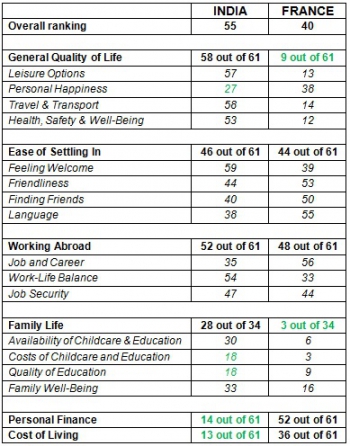11/30/2014
French expatriation vs Indian expatriation
I have received this study (link) by Internations regarding expatriation; I am not sure what the data are worth but the results seem to make sense to me, hence the sharing!
 I know comparing India and France is like comparing apple and pears, but I am a French working in India so… I was curious to see the results of both countries!
I know comparing India and France is like comparing apple and pears, but I am a French working in India so… I was curious to see the results of both countries!
In brief, people go to France for the quality of life and education (which is free).
And they go to India for the money.
Other than that, it seems as difficult to settle in and to work in both countries! In France the language is a problem whereas in India it is difficult to feel welcome – I must say Indians are very friendly and welcoming at first but sometimes, it feels like once they have satisfied their curiosity, they lose interest. You can do a better career in India (at least things go faster than in France) but the big winner in the work-life balance will definitely not be your life (the equation is pretty simple: difficult to socialise + well paid job with responsibilities = long hours at work)…
The study then gives a profile of Indian expats and French expats.
Indians tend to settle down in the host country (versus the ‘normal’ trend of changing country every 2-3 years). The French on the other hand tend to work in more countries than the average.
Indians speak several languages (80% speaking three or more languages) but mostly Indian ones and very few of them (34%) will learn the host country language – they generally relocate to English-speaking countries or in the Gulf (which has definitely more Indians than Arabs!). And they mostly mingle among each other (more than the average in fact). Despite a bad reputation at sucking at English, the French expat seem to know more languages than the average and they tend to learn the local language. But they mostly socialise among fellow countrymen as well…
86% of Indians are in a relationship with someone from their country, which is double the average: Indians definitely don’t leave the mother land in the search for love… Whereas the French, ah the French… 67% of those in a relationship have a non-French partner.
08:00 Posted in Expatriation (in India and in other countries) | Permalink | Comments (0) | Tags: india, france, expatriation, survey, internations | ![]() Facebook | |
Facebook | |
11/26/2014
You know you have been in India for too long when…
… you realise you speak English like them (and you didn’t even know it was not ‘proper’ English!).
If you use 3 or more of the expressions daily, then that’s it, you are one of them (us?? :-) ):
-
‘I will come at 4 only’ – Ending your sentence with ‘only’ without a reason really.
- 'Passing out' of school
-
'Kindly revert' – You reply or answer but not revert which means "to return to a former state".
-
'It happened years back' – Instead of years ago.
-
'Kindly do the needful' – Needful is an adjective, not a noun.
-
'Can we discuss about this?' – You discuss this, not about this.
-
'Let’s order for food' – You order food, not for food.
-
'Do one thing' – When someone approaches you with a query, and your reply begins with the phrase "do one thing”, it is an Indianism. It is only understood in India. It is not proper English. Like “My computer keeps getting hung.” And “Do one thing. Clear your history. Delete your cookies. Defrag your hardrive. Run a virus check. Restart your computer... ”
-
‘I can’t talk right now, I’m out of station.’ – extremely outdated.
-
'Prepone' – Because the opposite of postpone just has to be prepone, right? But in English you would “bring a meeting forward”.
Source: http://travel.cnn.com/mumbai/life/10-indianisms-652344
Another post on Indian-English: http://www.indiansamourai.com/archive/2008/05/22/indian-e...
08:00 Posted in Expatriation (in India and in other countries), Incredible India! | Permalink | Comments (0) | Tags: india, language, indianism, indian english | ![]() Facebook | |
Facebook | |
11/20/2014
The rock 'n roll crib - Part 3
BUT NO!!! Once your dear husband has found the crib of his dreams, he is not going to compromise for second-class options: “don’t you think this crib is gliding a little too fast? and it’s annoying, you can’t dismantle it easily no? and it will not even last for a year!”. Back to square one...
It briefly crosses our minds to get the mini-crib done locally. Indians are masters of it. But for questions of security and patience, we quickly drop the idea. On top of that our recent experiences in this field have not been conclusive, to say the least (cf his tailor-made wedding suit and alliance he never wore (not even on the wedding day)).
This is when your dear husband finds the website that specializes in getting stuff from the US (transportation and customs). Cost: at least the price of what you are buying. But anyway we were ready to spend that much from the beginning – and when you buy from Mother Care in India, it is much more expensive than in England. Since he is at it he buys a mattress on this site, because who says unique crib says unique size of mattress (not found in India nor in France). And there, incredible but true, in one week the crib was in our living room! And assembled in less than ten minutes! And meeting the expectations of the dear husband! (this was far from given) And he got to try the do-it-yourself American-style (he could build his baby’s bed!!) Pfffiou... 
Let’s see now what use we will make of our beautiful cradle and how we will manage sleep with Junior! Because it is very easy to talk, we don’t know what we will really do!! So we will just do our best… And hope that the baby will not suffer from a “lack of love”, or “sense of insecurity” if he/she does not sleep with the mother for at least twelve months (after all I and my brothers are quite balanced despite sleeping methods judged barbaric)!
The full story here: PDF
08:00 Posted in Expatriation (in India and in other countries), Incredible India!, Little Samourai, My stories in India | Permalink | Comments (0) | Tags: india, baby, craddle, crib, mini-crib | ![]() Facebook | |
Facebook | |















